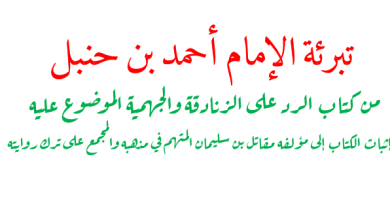Do I Need To Follow a Madhab?
“Do I Need To Follow a Madhab?” – Clarification Of a Common Misconception Amongst Muslims –
Imam Jalal al-Din al-Suyuti (d. 911 AH) said: “The difference found in the four Schools of Islamic law (Hanafi, Shafi, Maliki and Hanbali) in this nation is a huge blessing and an enormous virtue. It has a subtle hidden wisdom the intelligent are able to grasp, but the ignorant are blind of. I have even heard some of them say: ‘The Prophet (pbuh) came with one law, so where did the four Madhabs come from?” (Jazeel al-Mawahib, p.4)
Is Following One Of The Four Madhabs Necessary?
A Self-Assessment
1. All the sacred verses and hadith are in Arabic. The four Imams were experts in the Arabic language and I am not
2. The four Imams lived in an age that was described by the Prophet (pbuh) as the most blessed of Islamic ages. He (pbuh) said: The best of my Umma are those of my generation, then the (generation) that follows them and then the (generation) that follows them (Sahih al-Bukhari). Obviously, I cannot claim to have this distinguished credential.
3. All four Imams were attested as being the most God-fearing and pious of people by thousands of leading Ulama
4. Thousands of scholars throughout Islamic history considered the opinions of the Imams to be the most superior and refined understanding of the Qur’an and Sunna. Not a fraction of these numbers have ever attested to my wisdom or scholarly credentials
5. The four Imams have an extraordinary track record. That is, the whole Umma embraced their opinions for over a thousand years. Throughout the Muslim world, Muslims followed one of the four schools [see last section]. My view(s) cannot claim this profound acceptability. The companion Ibn Masud said: That which the Muslims deem to be good, is good with Allah (Musnad Imam Ahmad). The odd opinions I may concoct do not have this solid recommendation
6. In so many matters of life I only feel at ease if I get an expert’s advice. I turn to doctors, mechanics, architects and many other specialists to tell me what to do. My religion is the most important thing to me, thus it makes sense to rely on the greatest intellects of the Umma to guide me
7. A school is the best way to protect the Deen from untrained individuals twisting it to suit ulterior motives and desires. I do not know of a better way to protect the Deen from distortion than this
8. Other schools were never meticulously codified and refined as were the opinions of the four Imams. Thus it is a red herring to say why only follow these four and not the madhab of say, Thawri or Tabari etc.
9. If Salafism was the way of this Umma throughout its history, why would Sunni scholars continuously condemn it as a dangerous deviation? For example, the great scholar Ibn Rajab (d. 795 AH) wrote a book against them called: Refutation Of Those Who Follow Other Than The Four Schools (Ar-radd `ala man ittaba ghayr al-madhahib al-arba`a).
The Dangers Of Abandoning The Four Schools
We all love to be given a choice. Having a range of hats or shirts to choose from is a luxury. But it would be suicide if we brought this mentality of the marketplace into our religion. When a person says it is not obligatory for the Muslim to follow one of the established schools that is what he is doing. People are then free to shop for whatever opinion takes their fancy! This is termed making your desires into religion and it is forbidden by this verse: Have you seen the one who takes his desires as his god (45:23). If the millions and billions of Muslims were supposed to apply their minds to the verses and hadith, chaos would only result. Without the scholarly expertise (or a high level of fear of Allah ta`ala) they would make horrendous mistakes. One of the legacies of the four Imams was their accurate use of analogy. That is deducting new rulings where nothing is clearly mentioned. These master scholars expended their intellects on precisely discovering the basic reason behind a ruling (`illa). If that reason is found elsewhere, they concluded, the same ruling would apply. And likewise if it is absent in another context then the ruling does not apply. For instance, many of the intoxicants and drugs that exist today were not mentioned in revelation. Nevertheless, the Islamic jurists explained, because the basic reason behind the forbidding of alcohol was intoxication, logically these other substances must also be considered forbidden by Allah Almighty. But the Salafi/“ahle-Hadith” campaign to get rid of the schools and their rules, would have individuals (and we are witnessing it happening more and more frequently today) turning to the verses and hadith and arguing,-for example- “I think the reason why ablution (wudhu) was made necessary before prayers was due to the extreme heat people lived in back in those days. In our age we have air conditioners, deodorants etc. Thus since the original reason does not exist anymore, wudhu is no longer necessary” (!) Take another example: “The reason Islam forbade having boyfriends and girlfriends was because of the danger of children being born without there being anything to bind the father to take responsibility. Today, effective contraception is easily available and DNA testing ensures no father can deny his child, thus this fear is now fully taken care of. So Muslims should also embrace the culture of men and women freely mixing and dating.” If the regulation provided by the four schools is thrown away, how do you stop the many individuals that form part of the Umma, who are weak of iman and taqwa, from turning Islam into a carnival of desires? This horror story is the ultimate end of the simplistic call of Salafism. It is this same call that has tragically even led to individuals perpetrating mass-murder on the streets of many cities in the name of Islam! Rather, it is nothing but a subversion and mockery of Islam. The far-sighted scholars of the Ahl al-Sunna long ago understood how valuable these four schools were in safeguarding the Deen of Allah Almighty. So they issued a fatwa that it was necessary for every Muslim to learn and adhere to one of the four schools.
The Verdict Of The Ulama Of The Muslim World
[1] The famous Imam al-Haramayn Abu al-Ma‘āli Abd al-Malik bin Yusuf al-Juwayni (419-478 AH) writes in his book Al-Burhan:“The expert scholars have agreed that the masses are obligated (‘alayhim) with following the schools of the (four) Imams who thoroughly investigated and researched, who compiled the chapters (of Fiqh) and mentioned the circumstances of the rulings.” (vol. 2, P. 1146)
[2] Shaikh al-Islam Ahmad Ibn Hajr al-Haytami writes in Tuhfa al-Muhtaj fi Sharh al- Minhaj:“The claim the layman has no madh-hab is rejected, rather it is necessary (yalzamuhu) for him to do taqlīd of a recognised school. (As for the claim: scholars did not obligate following one school), that was before the codification of the schools and their establishment.” (Vol.12 p.491-Kitab al-Zakah)
[3] Imam al-Nawawi writes in Al-Majmu‘ Sharh Al-Muhadhdhab:“The second view is it is obligatory (yalzamuhu) for him to follow one particular school, and that was the definitive position according to Imam Abul-Hassan (the father of Imam al-Haramayn Al-Juwayni). And this applies to everyone who has not reached the rank of ijtihād of the jurists and scholars of other disciplines. The reasoning for this ruling is that if it was permitted to follow any school one wished it would lead to hand-picking the dispensations of the schools, following one’s desires. He would be choosing between Halal and Haram, and obligatory and permissible. Ultimately that would lead to relinquishing oneself from the burden of responsibility. This is not the same as during the first generations, for the schools that were sufficient in terms of their rulings for newer issues, were neither codified nor widespread. Thus on this basis it is obligatory for a person to strive in choosing a madh-hab which alone he follows.” (vol.1 p. 93)
[4] Shaikh Salih al-Sunusi writes in Fath al-‘Alee al-Malik fil-Fatwa ‘ala madh-hab al-Imam Malik:“As for the scholar who has not reached the level of ijtihād and the non-scholar, they must do taqlīd of the Mujtahid… And the most correct view is that it is obligatory (wajib) to adhere to a particular school from the four schools…” (p.40-41, in Usul al-Fiqh)
[5] Imam Sharani, an undisputed authority in the Shafi school writes in Al-Mizan al-Kubra:“…You (O student) have no excuse left for not doing taqlīd of any madh-hab you wish from the schools of the four Imams, for they are all paths to Heaven…” (p.55 vol.1)
[6] Imām Shams al-Din Dhahabī (673-748 AH) writes in Siyar A‘lam al-Nubalā under Ibn Hazm Zāhirī’s comment:“I follow the truth and perform ijtihād, and I do not adhere to any madh-hab”, “I say: yes. Whoever has reached the level of ijtihād and a number of imāms have attested to this regarding him, it is not allowed for him to do taqlīd, just as it is not seeming at all for the beginner layman jurist who has committed the Qur’ān to memory or a great deal of it to perform ijtihād. How is he going to perform ijtihād? What will he say? On what will he base his opinions? How can he fly when his wings have not yet grown?” (Vol.18, Pg.191)
[7] In the famous twelve volume Maliki compendium of fatāwā, Al-Mi‘yar al-Mu‘rib an fatāwā ahl al-Ifriqiyya wa al-Andalus wa al-Maghrib, Imam Ahmad al-Wanshirisi records the Fatwa on taqlīd: “It is not permitted (lā yajoozu) for the follower of a scholar to choose the most pleasing to him of the schools and one that agrees the most with him. It is his duty to do taqlīd of the Imam whose school he believes to be right in comparison to the other schools.” (vol.11 p.163-164)
[8] The Hanbali scholar Imam ‘Ala al-Din al-Mardawi in his major Juristic compendium Al-Insaf, cites the statement of the famous scholar Imam Al-Wazir ibn Hubaira (died 560 ah):“Consensus has been established upon taqlīd of every one of the Four Schools and that the truth does not lie outside of them.” (Vol.11 p.169, Dar al-Kutub al-‘Ilmiyyah).
[9] Imam Badr al-Din al-Zarkashi states in Al-Bahr al-Muhit,“There has been established a consensus amongst the Muslims that the truth is restricted to these (four) schools. This being the case it is not permitted to act upon an opinion from other than them. Nor is it permitted for ijtihād to occur except within them (i.e. employing their principles that is the tools of interpretation).” (vol.6 p.209)
[10] In the commentary of the Shafi text Jam‘ al-Jawami‘, Imam Al-Jalāl Shams al-Din al-Mahalli writes:“And the soundest position (wal-Asahh) is that it is obligatory (yajibu) for the non-scholar/layman and other than him of those (scholars) who have not reached the rank of ijtihād, adherence of one particular school from the madh-habs of the Mujtahid Imams (iltizam madh-hab Muayyan min madāhib al-Mujtahideen) that he believes to be preferable to another school or equal to it.” (Kitab al-ijtihād, p.93)
[11] Imam Rajab al-Hanbali writes in his book: “Refutation of anyone who follows other than the four schools” [A title that emphatically exposes the deception of the Salafi claim that it is they who represent true Islam]:“…that is the Mujtahid, assuming his existence, his duty (Farduhu) is to follow what becomes apparent to him of the Truth. As for the non-Mujtahid his duty is taqlīd.” Elsewhere having indicated in the latter the rarity of the lofty status of ijtihād, he states: “As for all other people who have not reached this level (of ijtihād), it is not allowed (lā yasau‘hu) for them but to do taqlīd of these Four Imams and to submit to that which the rest of the Ummah submitted to.” (Majmoo‘ al-Rasail Ibn Rajab, vol.2 p. 626 and p.624 respectively).
[12] In the famous commentary of the treatise of Imam Ibn Abi Zayd al-Qayrawani Al-Risalah, entitled “Al-Fawākih al-Dawāni,” Imam Ahmad al-Nafrawi (died 1126 ah) also confirms the Ijma of all the scholars that following one Imam is obligatory: “The consensus of the Muslims has been established upon the obligation (Wujub) of following one of the four Imams today; Abu Ḥanīfa, Malik, Shafi and Ahmad- May Allah be pleased with them… What we explained before, in terms of the obligation of following one of the four Imams, is in relation to those who do not possess the capability of performing ijtihād.” (vol.2 p.574, Bab Fi al-Ruyah wa al-Tathāub, 1997).
Download a pdf copy – link
Read online:






